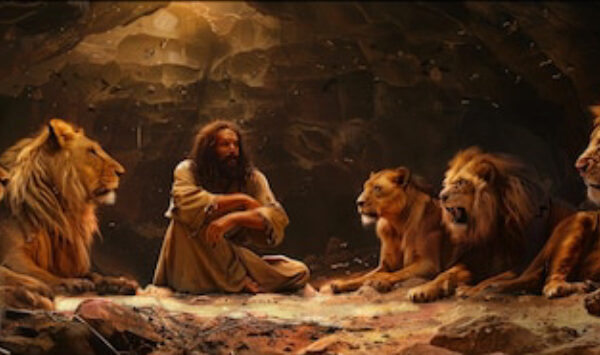Day One
Scripture Reading: Mark 1
The beginning of the good news about Jesus the Messiah, the Son of God, as it is written in Isaiah the prophet:
“I will send my messenger ahead of you,
who will prepare your way”—
“a voice of one calling in the wilderness,
‘Prepare the way for the Lord,
make straight paths for him.’”
And so John the Baptist appeared in the wilderness, preaching a baptism of repentance for the forgiveness of sins. The whole Judean countryside and all the people of Jerusalem went out to him. Confessing their sins, they were baptized by him in the Jordan River. John wore clothing made of camel’s hair, with a leather belt around his waist, and he ate locusts and wild honey. And this was his message: “After me comes the one more powerful than I, the straps of whose sandals I am not worthy to stoop down and untie. I baptize you with water, but he will baptize you with the Holy Spirit.”
At that time Jesus came from Nazareth in Galilee and was baptized by John in the Jordan. Just as Jesus was coming up out of the water, he saw heaven being torn open and the Spirit descending on him like a dove. And a voice came from heaven: “You are my Son, whom I love; with you I am well pleased.”
At once the Spirit sent him out into the wilderness, and he was in the wilderness forty days, being tempted by Satan. He was with the wild animals, and angels attended him.
After John was put in prison, Jesus went into Galilee, proclaiming the good news of God. “The time has come,” he said. “The kingdom of God has come near. Repent and believe the good news!”
As Jesus walked beside the Sea of Galilee, he saw Simon and his brother Andrew casting a net into the lake, for they were fishermen. “Come, follow me,” Jesus said, “and I will send you out to fish for people.” At once they left their nets and followed him.
When he had gone a little farther, he saw James son of Zebedee and his brother John in a boat, preparing their nets. Without delay he called them, and they left their father Zebedee in the boat with the hired men and followed him.
They went to Capernaum, and when the Sabbath came, Jesus went into the synagogue and began to teach. The people were amazed at his teaching, because he taught them as one who had authority, not as the teachers of the law. Just then a man in their synagogue who was possessed by an impure spirit cried out, “What do you want with us, Jesus of Nazareth? Have you come to destroy us? I know who you are—the Holy One of God!”
“Be quiet!” said Jesus sternly. “Come out of him!” The impure spirit shook the man violently and came out of him with a shriek.
The people were all so amazed that they asked each other, “What is this? A new teaching—and with authority! He even gives orders to impure spirits and they obey him.” News about him spread quickly over the whole region of Galilee.
As soon as they left the synagogue, they went with James and John to the home of Simon and Andrew. Simon’s mother-in-law was in bed with a fever, and they immediately told Jesus about her. So he went to her, took her hand and helped her up. The fever left her and she began to wait on them.
That evening after sunset the people brought to Jesus all the sick and demon-possessed. The whole town gathered at the door, and Jesus healed many who had various diseases. He also drove out many demons, but he would not let the demons speak because they knew who he was.
Very early in the morning, while it was still dark, Jesus got up, left the house and went off to a solitary place, where he prayed. Simon and his companions went to look for him, and when they found him, they exclaimed: “Everyone is looking for you!”
Jesus replied, “Let us go somewhere else—to the nearby villages—so I can preach there also. That is why I have come.” So he traveled throughout Galilee, preaching in their synagogues and driving out demons.
A man with leprosy came to him and begged him on his knees, “If you are willing, you can make me clean.”
Jesus was indignant. He reached out his hand and touched the man. “I am willing,” he said. “Be clean!” Immediately the leprosy left him and he was cleansed.
Jesus sent him away at once with a strong warning: “See that you don’t tell this to anyone. But go, show yourself to the priest and offer the sacrifices that Moses commanded for your cleansing, as a testimony to them.” Instead he went out and began to talk freely, spreading the news. As a result, Jesus could no longer enter a town openly but stayed outside in lonely places. Yet the people still came to him from everywhere.
Devotional:
One way to look at Mark is that he had a particular audience in mind, much like the other three Gospels. It is believed that Mark wrote primarily to Romans and presented Christ as the Suffering Servant of God.
The Romans were Gentiles and not concerned with Jewish history and traditions, so it takes a different approach from Matthew. For instance, there is no genealogy and the first healing presented is the casting out of an unclean spirit. As we read through Mark, you may notice that Mark focuses more on what Christ did, whereas Matthew focused on what Jesus said.
In no way does this imply that the accuracy of Mark or Matthew is questionable. On the contrary, differences in presentation of actual events by different writers would be expected. In addition, there were multiple eyewitnesses to these events, each with their own particular perspective.
Mark is very economical with words and gets right to the point, Jesus is the Son of God. Likewise the treatment of John’s ministry and Jesus’ baptism and temptation are very concise. The majority of the 1st chapter contains accounts of the calling of disciples and Jesus’ first healings.
One episode at the end of the chapter illuminates one of the problems Jesus faced. If those that were healed went out and told everyone what happened to them, Jesus wasn’t even able to enter a city. This was a problem since he had told his disciples specifically that he needed to go preach in the cities. No wonder that Jesus commanded that they were not to tell anyone.
Questions to ponder:
- Twice in this chapter the people are shown being amazed at Jesus’ teaching, because it had authority. What do you think this means?
- Mark uses “immediately” “at once” “without delay” “as soon as” in this chapter. Find them and think about the effect this has on the narrative.



